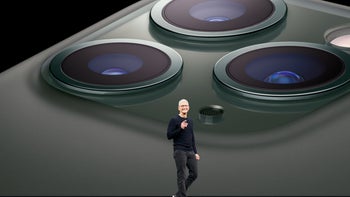The House Judiciary Committee demands an answer today from Apple CEO Tim Cook and three other CEOs

Big Tech is under attack from Congress. And now, according to Axios, House antitrust investigators are giving Apple, Alphabet, Amazon, and Facebook until today (Sunday, June 14th) to respond to the investigators about whether they will testify in the Judiciary Committee's investigation over competition in the tech industry. Axios was able to get a look at letters sent by the House Judiciary Committee to the aforementioned tech firms seeking documents and answers from each company's CEO. The committee wants to hold a hearing with each CEO in July.
Politicians want to come up with new antitrust laws directed at tech firms
The House is playing hardball with these tech giants. The letters mention that the committee might issue subpoenas in order to compel testimony and the production of documents if the companies don't comply. Antitrust subcommittee chairman David Cicilline (RI-D) said, "These are documents that are essential to complete our ongoing, bipartisan investigation of the digital marketplace. This is the appropriate process to secure their production." These documents include paperwork that tech firms already produced for other investigations and documents produced internally.

Members of the House Judiciary Committee want documents and answers from tech CEOs
The politicians have been looking to develop new antitrust laws. Tech firms like Google have been accused of having a monopoly in the search and online advertising industries. And some phone manufacturers say that Google is forcing them to equip their phones with the Chrome browser and Google Search if they want to license Google's version of Android. You might recall that last July, the House antitrust subcommittee and Chairman Cicilline spoke with executives from Apple, Amazon, Facebook, and Google about competition in the tech sector.
Apple is under attack for the way it conducts business in the App Store. The so-called Apple tax allows the company to take a 30% cut of in-app purchases that are rung up on Apple's own App Store platform. And because Apple doesn't allow iOS users to sideload apps, some politicians and tech executives complain that Apple is violating antitrust laws. Last year at this time, Apple CEO Tim Cook said that the company is not a monopoly. He pointed out that while the company does own 30%-35% of the U.S. smartphone market, he says that Apple is not too big and does not need to be broken up into smaller units.
Cook's comments last year didn't address other bullying tactics that Apple could be guilty of committing. Last September, Tile complained that Apple stopped selling its tracking products and "crippled" its location-tracking capabilities in iOS. Not coincidentally, Apple is supposed to introduce its own competing AirTags product this year, possibly as soon as next week when WWDC kicks off. And the founder of music streamer Spotify, Daniel Elk, famously accused Apple last year of having an unfair advantage. Because of the 30% "Apple tax," Spotify is not on equal footing in the App Store with Apple's own Apple Music. Spotify's options are to tack on the 30% tax and let iOS users pay for it, or take a hit to its margins. The world's largest music streamer decided on the former which puts it at a competitive disadvantage with Apple Music in the App Store.
But as Apple itself pointed out a year ago, the "tax" it is charging Spotify works out to 15% (not 30%) on only 680,000 customers. These are Spotify members who converted from the free ad-supported service to a premium membership using Apple's in-app payment system (iAP) between 2014-2016. The 30% "tax" drops down to 15% annually after the first year. And those upgrading to Spotify's premium service from its free tier after 2016 were no longer able to pay for their subscription inside the App Store thus avoiding the 30% Apple tax.
Besides Spotify, Netflix also considers the App Store to be a monopoly. In 2018 the video streamer told new and returning iOS subscribers that they could no longer pay for those subscriptions from the App Store.










Things that are NOT allowed: